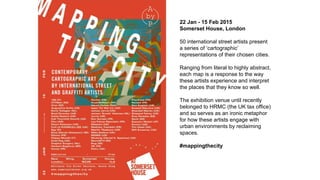Mapping the city
- 1. 22 Jan - 15 Feb 2015 Somerset House, London 50 international street artists present a series of ŌĆścartographicŌĆÖ representations of their chosen cities. Ranging from literal to highly abstract, each map is a response to the way these artists experience and interpret the places that they know so well. The exhibition venue until recently belonged to HRMC (the UK tax office) and so serves as an ironic metaphor for how these artists engage with urban environments by reclaiming spaces. #mappingthecity
- 2. Mapping the city ŌĆ£Whereas most people go about their business concerned with the business of getting from A to B, the street artist studies and surveys, carefully considering the cityŌĆÖs potential, looking for dialogue opportunities, and along the way builds up a mental map drawn from an intriguing perspectiveŌĆ”"
- 4. The call for submissions consisted of three words ŌĆśMap your spaceŌĆÖ and this was how the artists responded.
- 6. 108 ŌĆśMind Maps of Alessandria, during the dayŌĆÖ108 ŌĆśMind Maps of Alessandria, during the nightŌĆÖ ŌĆ£The way we visualise space is radically different from moment to moment. Just in 24 hours, think about the way space looks and feels at night time compared to how it looks and feels in the day. ItŌĆÖs a totally different way of understanding space, so why should it look the same on a map?ŌĆØ
- 7. Chu ŌĆśBuenos AiresŌĆÖ 2012 ChuŌĆÖs map communicates the kinetic nature of street life. "I tried to create a map of Buenos Aires marking my usual movements around the city. I am used to moving around it a lot, from one side to other, and sometimes it is really chaotic and stressful. However it is also really where I get a lot of inspiration."
- 8. Jurne 2013
- 10. Sixe Paredes ŌĆśBarcelonaŌĆÖ 2013
- 11. Sixe Paredes ŌĆśBarcelonaŌĆÖ (detail), 2013 You can recognise the street layout and landmarks like the Sagrada Familia. ŌĆ£It's using a style of his work he calls circuits. He's obsessed by numbers, numerology and the Kabbalah, and he has his own numeric system and cuneiform form of writing. All of the letters and numbers reference moments in his life or people that he's met. He shows these experiences and hides them at the same time.ŌĆØ
- 12. Egs, Finland
- 13. MOMO ŌĆśTag ManhattanŌĆÖ 2013 [original project 2006] A hand-drawn map and a video presents the largest tag in the world. The 12.8km continuous line was created using a device attached to his bicycle to drip his name, MOMO, in block-long letters across the entire width of Manhattan. Hidden in plain sight, the physical line only creates meaning when itŌĆÖs abstracted to the level of the whole city.
- 14. Spok, Madrid
- 15. Will Sweeney ŌĆśCabott SquareŌĆÖ 2014 Brad Downey, USA
- 16. ŌĆ£I went some years ago to Vienna, I visited one of the best museums IŌĆÖve ever been; The Globe Museum. There I foundŌĆ” a globe from the XIV century; America was not thereŌĆ” of course, the continent was discovered by mistake in 1492! So instead of my country there was a big oceanŌĆ” That gave me the idea of creating a globe of the world as I know it. I got rid of all the maps and references I have around and created this globe completely from my memories and my geography knowledge. It is a hard memory exercise, the results are not always as expected and it is interesting to compare it to a real globe.ŌĆØ Martin Tibabuzo ŌĆśMi mundo/ Meine WeltŌĆÖ 2013
- 17. Swoon ŌĆśBangkokŌĆÖ 2012 Known for creating scenes that carefully examine the "relationship of people to their built environmentŌĆØ, Swoon chose the Thai capital Bangkok as her inspiration. In her work, the body and the city is intertwined - the experience, as she says, "of becoming part of the fabric of the city".
- 18. Shephard Fairey ŌĆśBerlin TowerŌĆÖ 2011
- 19. Mapping the City, 22 Jan - 15 Feb 2015, Somerset House, London
- 20. Presented by Kieran McMillan Senior UX Designer working in Berlin at HERE.com, a global leader in mapping.













![MOMO ŌĆśTag ManhattanŌĆÖ 2013 [original project 2006]
A hand-drawn map and a
video presents the
largest tag in the world.
The 12.8km continuous
line was created using a
device attached to his
bicycle to drip his name,
MOMO, in block-long
letters across the entire
width of Manhattan.
Hidden in plain sight, the
physical line only creates
meaning when itŌĆÖs
abstracted to the level of
the whole city.](https://image.slidesharecdn.com/mjpkl9edsxk91runiiot-signature-9d8a57f5588f49ac7c2f85c4ab1ca35b3a016e4a8476079b6261acaa7773d517-poli-150209152003-conversion-gate02/85/Mapping-the-city-13-320.jpg)






